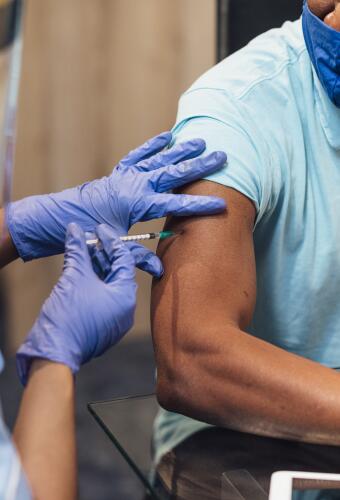6 Things to Know About the Shingles Vaccine

Medically Reviewed By William C. Lloyd III, MD, FACS
Written By Lorna Collier on August 10, 2021
-
 Shingles Vaccine Facts to Know Before You Get ImmunizedAbout a third of us can expect to get shingles at some point in our lives. This condition can cause excruciating pain for many people and lead to potentially severe, life-altering side effects for some. Yet it can be avoided entirely by getting immunized against the virus that causes shingles, especially with a new, more effective vaccine. Are you a candidate? Here are shingles vaccine facts that may help you prevent getting this illness.
Shingles Vaccine Facts to Know Before You Get ImmunizedAbout a third of us can expect to get shingles at some point in our lives. This condition can cause excruciating pain for many people and lead to potentially severe, life-altering side effects for some. Yet it can be avoided entirely by getting immunized against the virus that causes shingles, especially with a new, more effective vaccine. Are you a candidate? Here are shingles vaccine facts that may help you prevent getting this illness. -
 1. A new shingles vaccine is available.The shingles vaccine Shingrix was approved by the U.S. Food & Drug Administration and became available in 2017. The vaccine is approved by the FDA (Food and Drug Administration) for healthy people 50 and older and for people 18 years and older whose immune system is weakened or compromised by a medical condition or immune-suppressing medications. An earlier vaccine called Zostavax is no longer available in the U.S. If you previously received Zostavax, talk with your healthcare provider about when you should get the Shingrix vaccine.
1. A new shingles vaccine is available.The shingles vaccine Shingrix was approved by the U.S. Food & Drug Administration and became available in 2017. The vaccine is approved by the FDA (Food and Drug Administration) for healthy people 50 and older and for people 18 years and older whose immune system is weakened or compromised by a medical condition or immune-suppressing medications. An earlier vaccine called Zostavax is no longer available in the U.S. If you previously received Zostavax, talk with your healthcare provider about when you should get the Shingrix vaccine. -
-
 2. The new shingles vaccine is much more effective.Shingrix must be administered in two shots, about two to six months apart, which means you make two trips to the doctor's office or clinic. But for this inconvenience, you gain a greater chance of avoiding getting shingles. That's because Shingrix is more than 90% effective in preventing the illness, especially in the first year after getting the vaccine. By comparison, Zostavax was given in one shot but was only about 50% effective in preventing shingles.
2. The new shingles vaccine is much more effective.Shingrix must be administered in two shots, about two to six months apart, which means you make two trips to the doctor's office or clinic. But for this inconvenience, you gain a greater chance of avoiding getting shingles. That's because Shingrix is more than 90% effective in preventing the illness, especially in the first year after getting the vaccine. By comparison, Zostavax was given in one shot but was only about 50% effective in preventing shingles. -
 3. Vaccines have benefits even if they don’t prevent shingles.Even if the vaccines don't keep you from getting shingles, studies show they can help if you do get the disease. Your blisters are likely to heal more quickly and your shingles pain is likely to be less severe. You also will be at lower risk for post-shingles complications, such as postherpetic neuralgia (PHN), a type of severe nerve pain that affects 10 to 15% of shingles sufferers and lasts long after the rash is gone. If you develop shingles—with or without being vaccinated—see your doctor for treatment right away. Antiviral medicines can make the condition more bearable by relieving symptoms and reducing the risk of complications.
3. Vaccines have benefits even if they don’t prevent shingles.Even if the vaccines don't keep you from getting shingles, studies show they can help if you do get the disease. Your blisters are likely to heal more quickly and your shingles pain is likely to be less severe. You also will be at lower risk for post-shingles complications, such as postherpetic neuralgia (PHN), a type of severe nerve pain that affects 10 to 15% of shingles sufferers and lasts long after the rash is gone. If you develop shingles—with or without being vaccinated—see your doctor for treatment right away. Antiviral medicines can make the condition more bearable by relieving symptoms and reducing the risk of complications. -
 4. The shingles vaccine can cause side effects.The Shingrix vaccine can cause pain, redness and swelling at the injection site. It can also cause headache, muscle pain, tiredness, shivering, fever, and upset stomach. Most side effects are considered mild to moderate and last no more than three days. In rare instances, people have experienced a chickenpox-like rash after the vaccine or other adverse events.
4. The shingles vaccine can cause side effects.The Shingrix vaccine can cause pain, redness and swelling at the injection site. It can also cause headache, muscle pain, tiredness, shivering, fever, and upset stomach. Most side effects are considered mild to moderate and last no more than three days. In rare instances, people have experienced a chickenpox-like rash after the vaccine or other adverse events. -
 5. Shingrix shortages have been reported.Some intermittent shortages of Shingrix have been reported due to the high demand for this new vaccine. If this occurs after you have taken your first dose of Shingrix, the CDC recommends your doctor administer the second dose as close to six months as possible, rather than restarting the two-shot process or using Zostavax instead.
5. Shingrix shortages have been reported.Some intermittent shortages of Shingrix have been reported due to the high demand for this new vaccine. If this occurs after you have taken your first dose of Shingrix, the CDC recommends your doctor administer the second dose as close to six months as possible, rather than restarting the two-shot process or using Zostavax instead. -
-
 6. Some people should avoid or delay getting shingles vaccines.If you have a moderate or severe acute illness, you should delay getting a shingles vaccine, according to the CDC. (A minor illness, such as a cold, shouldn't prevent you from getting the vaccine.) Other contraindications for the vaccine include being pregnant or breastfeeding; having a history of allergic reaction to gelatin, the antibiotic neomycin, or any other component of the vaccines; and having an active case of shingles. If you have a weakened immune system, take immune-suppressing drugs, or have cancer affecting the bone marrow or lymphatic system (such as leukemia or lymphoma), ask your doctor before getting the Shingrix vaccine.
6. Some people should avoid or delay getting shingles vaccines.If you have a moderate or severe acute illness, you should delay getting a shingles vaccine, according to the CDC. (A minor illness, such as a cold, shouldn't prevent you from getting the vaccine.) Other contraindications for the vaccine include being pregnant or breastfeeding; having a history of allergic reaction to gelatin, the antibiotic neomycin, or any other component of the vaccines; and having an active case of shingles. If you have a weakened immune system, take immune-suppressing drugs, or have cancer affecting the bone marrow or lymphatic system (such as leukemia or lymphoma), ask your doctor before getting the Shingrix vaccine.
6 Shingles Vaccine Facts You Should Know













